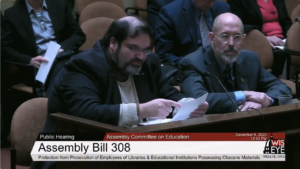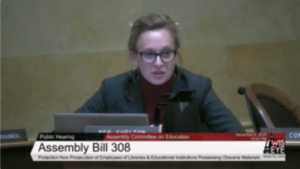During this summer, a team of students from MIT embarked on a journey to the sou …
Wisconsin Contemplates Charging Educators and Librarians for Possession of ‘Obscene’ Books
Emma Wordsmith

Teachers and library staff in Wisconsin may face potential prosecution for allowing K-12 students to access certain books or materials, according to a new proposal by Republican legislators. The bill, known as AB-308, aims to restrict the content that K-12 students can see or read and would eliminate the protections that currently shield educators and library staff from being prosecuted for providing “obscene” materials to minors. If passed, this legislation would make teachers and library staff who provide inappropriate books or media to students considered felons.
Shortly after the Assembly education committee hearing, Dr. Jill Underly, the state superintendent of public instruction, expressed her concern on Twitter. Underly emphasized the importance of having spaces to engage with new ideas and history while opposing hate, threats, and attempts to silence free thought. She described libraries as essential hubs of freedom of thought, expression, and creativity.
Underly further shared a video of her statements from a late November press conference, highlighting the significance of school libraries as welcoming and exciting places for children to explore new ideas and stories. She expressed concern about the increasing attempts to censor and spread disinformation against school libraries and emphasized the importance of inclusive spaces.
During the hearing, State Representative Scott Allen and State Senator Andre Jacque defended the bill against concerns. Allen acknowledged the existence of sexually explicit material in schools and argued that teachers and educators should be held responsible for ensuring that such content is not accessible to minors.

The current law exempts librarians and teachers from prosecution under the state’s obscene materials laws to ensure the free flow of literary and educational materials. Allen defined “obscene material” as any content that could provoke immoderate or unwholesome desires, sexually explicit depictions that are offensive, or content lacking significant literary, artistic, political, educational, or scientific value. He argued that sexually explicit material should not be given to 12-year-olds and urged for the same level of responsibility for those working with minors as for any other citizen.
Allen and Jacque clarified that the bill does not aim to ban books but merely acknowledges that not all books or materials may be suitable for all age groups, particularly those with sexually explicit or perverse content. They stated that the bill addresses a common-sense expectation and highlights the need to protect the innocence of young children from content deemed inappropriate. Supporters of the bill, including organizations like Gays Against Groomers and Wisconsin Family Action, argue that it is necessary to shield children from materials that go against their parents’ values and teachings.
Wisconsin Examiner reported that emails obtained last year showed parents compiling lists of books they deemed inappropriate for young students and recommending the prosecution of teachers and library staff who provided such books. Allen was among the lawmakers who received these emails, prompting the proposal to restrict books and penalize school staff.
Earlier this year, Allen and Jacque released co-sponsorship memos for legislation that aimed to remove protections for school staff and prevent school districts from using funds to purchase materials deemed obscene. During the December 5 hearing, supporters of the bill who testified included representatives from groups like Gays Against Groomers and Moms for Liberty, who argued for the protection of young children’s innocence from teachers with alleged agendas.

The hearing included evidence of books found in various school districts across Wisconsin, provided by parents who considered them inappropriate. Some of these books contained sexual content, violence, self-harm descriptions, and controversial religious commentary. The bill faced opposition from around 10 groups, including the ACLU of Wisconsin and associations representing school district administrators, school nurses, school business officials, and librarians. The bill underwent scrutiny from Democratic committee members who argued against its potential consequences for different communities and the policing of their values. Legislative counsel clarified that the bill could not hold teachers criminally liable for materials allowed by their districts. The hearing also sparked discussions around school library policies and the role of parents in determining what is appropriate for their children.
While the bill continues to face debate and opposition, Allen and Jacque reassured opponents


